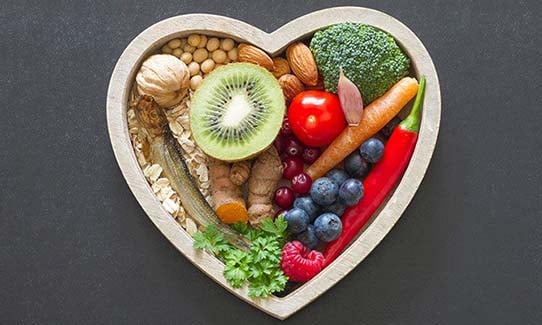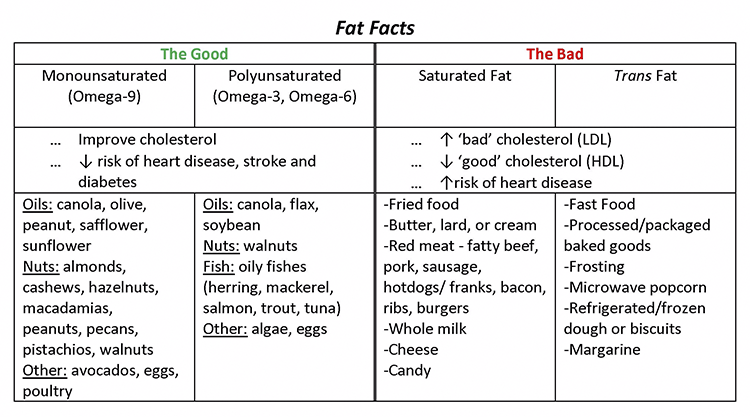

Feb 10 2022
Eat Your Heart Out (of Danger)


Summary
A diet high in sodium and fat, specifically saturated and trans-fats, increases your risk for heart disease and stroke.
Not only is heart disease the No. 1 killer in America, but it is also a major cause of disability for many who suffer from it.
A diet high in sodium and fat, specifically saturated and trans-fats, increases your risk for heart disease and stroke. A sedentary lifestyle also increases your risk.
Fats
For overall heart health, try to limit foods high in saturated and trans-fats. Saturated fats can be found in fatty meat, poultry skin, bacon and sausage; whole fat dairy like cream, butter and whole milk; candy and sweets. Trans-fat can be found in stick margarine, shortening, fried foods and packaged foods with hydrogenated oils.
Fruits, Vegetables & Whole Grains
To support a strong and healthy heart, choose more fruits, vegetables and whole grains in place of highly processed foods. Eating more fruits and vegetables will increase fiber and essential vitamins and minerals. The recommended daily amount of fiber is 25-30g daily, and most Americans do not get enough.
Aim for five cups of fruits and vegetables plus three ounces of whole grains daily to meet this recommendation. Focus on leaner proteins such as skinless chicken or turkey breast, fish or seafood and lower fat dairy to avoid excess fat and calories.
Omega-3 Fatty Acids
Omega-3 fatty acids are heart-healthy fats. Good sources include salmon, wild caught tuna, sardines, ground flaxseed and walnuts. Incorporate Omega-3 sources twice or more per week. Drinking more water and limiting sugary beverages also helps your heart.
Salt
Be careful with the salt shaker. However, 70% of the sodium consumed daily comes already in the food we eat. Removing the salt shaker from the table helps reduce temptation. Sea salt is no lower in sodium than regular salt.
Try to use more salt-free herbs and spices such as garlic, pepper, lemon, vinegar or salt-free seasoning blends. Select foods labeled “reduced salt” or “low sodium,” which is defined as less than 140 mg of sodium per serving. Note that 400 mg or more of sodium per serving is considered high. Salt is not always salty and hides easily in items like instant pudding, instant oatmeal, quick breads/mixes, packaged mixes, frozen dinners/pizza, pickled foods, cured meats, ramen noodle mixes and condiments.
Heart-Healthy Habits
- Eat less total fat, sodium and cholesterol; processed foods, fried foods and fast foods
- Eat more fruits, vegetables, whole grains, low-fat dairy, poultry, fish and nuts. Remember, the fresher, the better.
- Drink less soda and sweet tea
- Drink more water or other calorie-free beverages
- Exercise more—at least 30 minutes five days a week



Emily Littlejohn, MS, RD, LD
Emily Littlejohn, MS, RD, LD, is a registered dietitian with NMMC’s Population Health Department. Emily holds bachelor’s and master’s degrees in food and nutrition services from the University of Mississippi. She offers nutrition counseling by appointment at the NMMC Wellness Center in Tupelo. Call (662) 377-7803 for more information.
Nutrition plays a key role in health, healing and living a well-balanced life. Whether you need support for special dietary concerns or simply want to eat more healthfully, we can help.
Call (662) 377-7803 to request nutrition counseling.

Subscribe to Our Newsletter
Like this content and want to get more? Sign up for True North, the health and wellness newsletter from North Mississippi Health Services!

Subscribe to Our Newsletter
Like this content and want to get more? Sign up for True North, the health and wellness newsletter from North Mississippi Health Services!

Nurse Link®
Not sure if you need Urgent Care or the ER? Call 1-800-882-6274 anytime to speak directly to a registered nurse and get immediate answers. Using computerized medical protocols, nurses direct callers to the most appropriate treatment. Our nurses are available 24 hours per day, seven days per week.